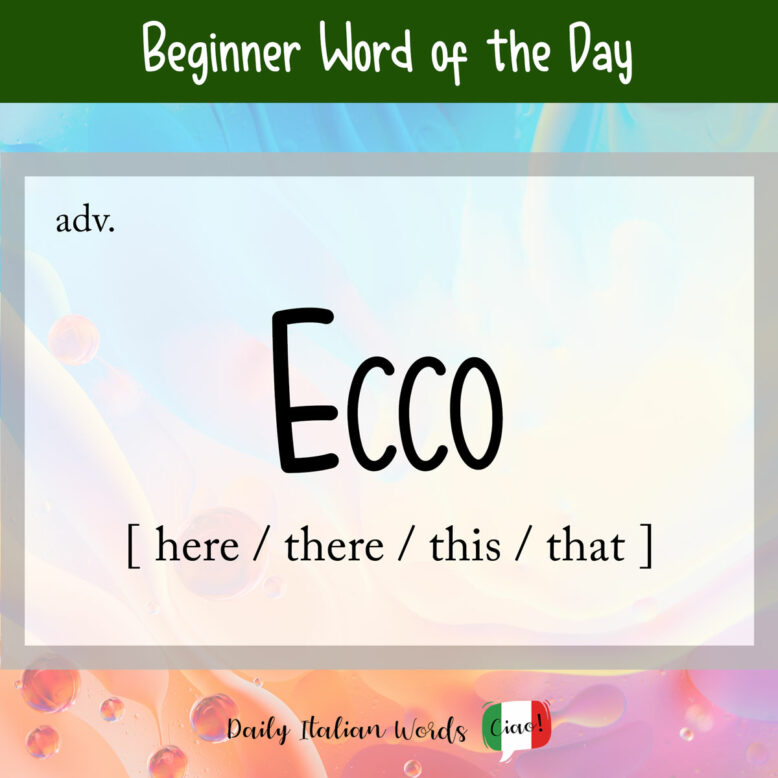If you’ve been asking yourself what the word “ecco” means in Italian, you aren’t alone! Ecco is one of those multifaceted words in Italian that learners must use and hear in various situations in order to fully understand the scope of its meaning.
Although in many situations you can safely translate ecco with the words here, there, this and that, this isn’t always the case.

1. ‘Ecco’ to announce the presence of something
One of the most common usages of ecco is to announce the presence of someone or something that is in close proximity to the interlocutor, much like the words ‘here‘ and ‘there‘ in English. In this case, ecco may be followed by the adverbs qui / qua (here) to provide extra emphasis.
- Ecco (qui) mia mamma! = Here’s my mom!
- Ecco (qui) il libro che volevi! = Here’s the book you wanted!
- Ecco (qui) i miei occhiali! = Here are my glasses!
Ecco can also be attached directly to personal pronouns.
- Eccomi! = Here I am!
- Eccoti! = There you are!
- Eccolo! = There he is!
- Eccola! = There she is!
- Eccone uno! = Here’s one!
- Eccoci! = Here we are!
- Eccovi! = There you are!
- Eccoli! = There they are! (m.)
- Eccole! = There they are! (f.)
- Eccone alcuni! = Here are some!
Using the same structure, you can also introduce a person to someone else.
Ecco Paolo, il fidanzato di Lucia.
This is Paolo, Lucia’s fiancé.

2. ‘Ecco’ combined with question words
Ecco can be combined with various question words with the meaning of this is or that is. It is used when giving an explanation.
- ecco perché = this is why / that is why
- ecco cosa = this is what / that is what
- ecco quello = this is what / that is what
- ecco dove = this is where / that is where
- ecco quando = this is when / that is when
- ecco come = this is how / that is how
Ci sarà anche Daniela alla festa. – Ah, ecco perché ci vuoi andare!
Daniela is going to be at the party too. – Ah, that’s why you want to go!
Il presidente ha deciso: ecco quando si dimetterà.
The president has decided: this is when he will resign.

3. Ecco followed by the past participle
Whenever ecco is followed by the past participle, it indicates a completed action imbued with a sense of satisfaction. One of the most common phrases you will hear Italians say when they’ve finished something is ecco fatto, which is similar to the English “all done” or “done and dusted“. Here are a few other common phrases:
- Eccoci arrivati! = Here we are! / We made it!
- Ecco risolto! = That’s solved then!
Ecco fatto! Le valigie sono pronte!
All done! The suitcases are ready!

4. Ecco + che
When ecco is followed by the conjunction che (that), it means “right at this moment”. In other words, it places focus on the imminent nature of the action.
Ecco che arriva il taxi!
Here comes the taxi (right at this moment)!
In other contexts, especially when accompanied by allora (so / then) or quando (when), it means “that’s when…” It is often used when something happens abruptly or unexpectedly.
Quando si uniscono lavoro e passione, ecco che allora si produce qualcosa di molto bello!
When you combine work with passion, that’s when you produce something really good!

5. Ecco as an interjection or filler
Ecco is also a very commonly used interjection or filler word. Here are a few common phrases in which ecco as an interjection appears:
- Ah, ecco. = Ah, I see / I get it.
- Ecco, lo sapevo. = Aha, I knew it.
- Ecco, te l’avevo detto. = See, I told you so.
- Ecco, ora vengo. = Ok, I’m coming now.
Fillers are employed to give the speaker time to think about what they want to say next.
Ah ecco! Ora ho capito come funziona!
Ah I get it! Now I understand how it works!

Who would have imagined that a word, so small and seemingly insignificant, could play such an important role in daily communication between Italian people?
Now that you know the meaning of ecco in Italian, we encourage you to go out and use it!
Heather Broster is a graduate with honours in linguistics from the University of Western Ontario. She is an aspiring polyglot, proficient in English and Italian, as well as Japanese, Welsh, and French to varying degrees of fluency. Originally from Toronto, Heather has resided in various countries, notably Italy for a period of six years. Her primary focus lies in the fields of language acquisition, education, and bilingual instruction.


